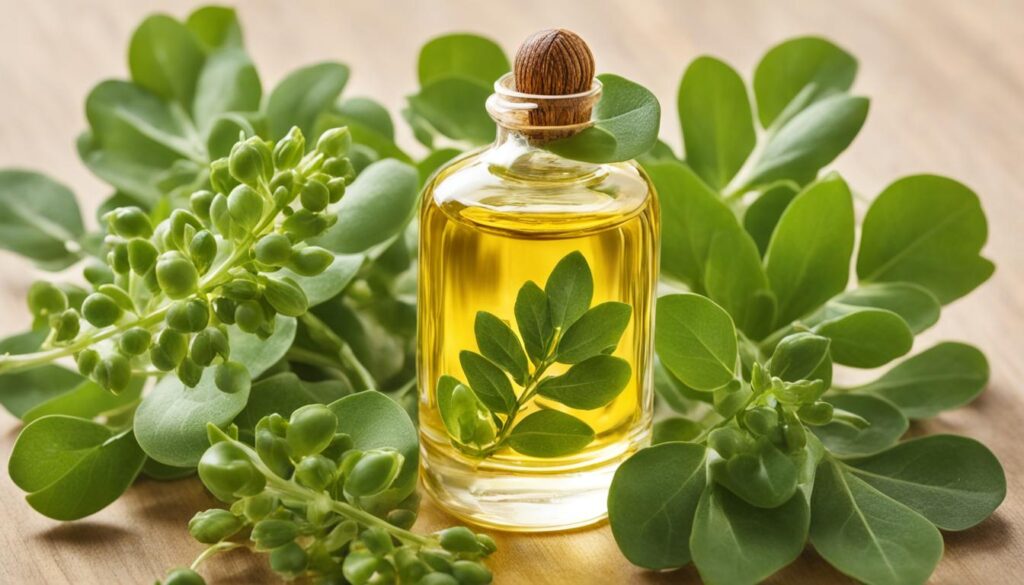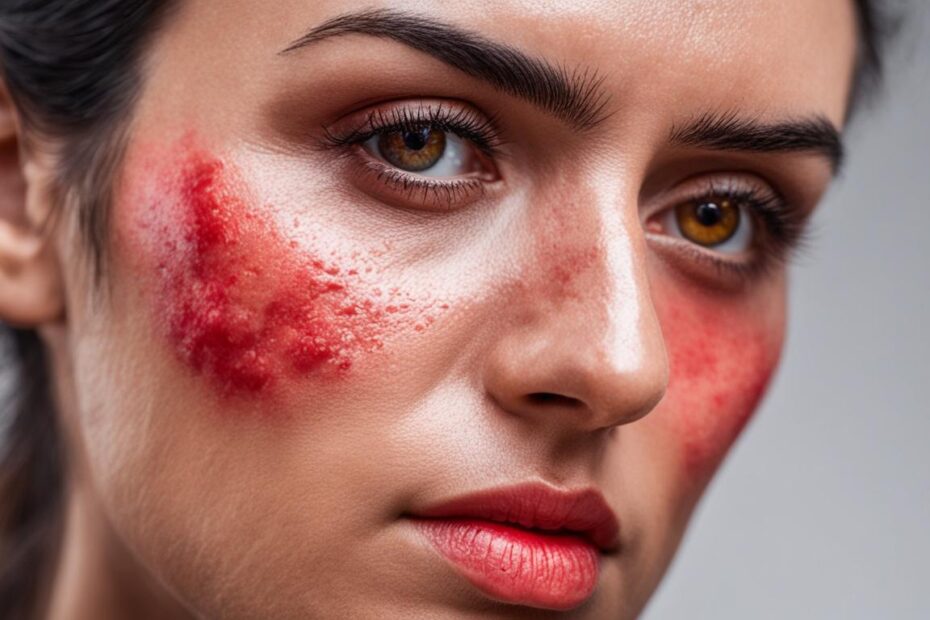When it comes to skincare, finding the right products for your specific needs can be challenging. If you have acne-prone skin, you may have heard mixed opinions about castor oil and its effects on breakouts. In this article, we will explore the question: Will castor oil break me out?
Castor oil is often praised for its potential acne-fighting properties, thanks to its antimicrobial and anti-inflammatory qualities. However, it’s essential to consider the individual characteristics of your skin before incorporating castor oil into your skincare routine.
Some individuals may find that castor oil clogs their pores, leading to irritation and an increase in oil production. This can potentially contribute to breakouts and exacerbate acne concerns. Understanding the properties of castor oil, such as its high ricinoleic acid content, can help you make an informed decision about whether it is suitable for your skin.
Key Takeaways:
- Castor oil has antimicrobial and anti-inflammatory properties that make it attractive for acne treatment.
- However, castor oil can clog pores, cause skin irritation, and worsen breakouts for some individuals.
- Its effectiveness as an acne treatment lacks solid scientific evidence.
- Understanding the properties of castor oil and considering alternative options can help in managing acne-prone skin.
- Consulting a skincare professional can provide personalized guidance on the best course of action for your skin.
The Drawbacks of Using Castor Oil for Acne
While castor oil has some potential benefits for acne-prone skin, it also comes with several drawbacks that should be considered.
Firstly, castor oil can be overly drying for the skin, which can lead to dehydration and increased oil production. This can create an imbalance in the skin and potentially worsen acne breakouts.
Furthermore, the thick and heavy consistency of castor oil can clog pores, leading to skin irritation and the formation of pimples. Its occlusive nature can prevent the skin from breathing and cleansing itself properly, exacerbating acne issues.
“The drying and clogging effects of castor oil can potentially aggravate acne-prone skin and hinder the healing process.”
It is also important to note that the effectiveness of castor oil as an acne treatment is not supported by robust scientific studies. While many anecdotal reports claim its benefits, there is a lack of evidence to substantiate these claims.
Considering these potential side effects and the abundance of misinformation surrounding castor oil, it may be wise to explore alternative options for acne management. There are numerous skincare products and practices available that specifically target acne without the drawbacks associated with castor oil.
The Benefits of Seeking Alternative Acne Solutions
Fortunately, there are plenty of effective alternatives to castor oil for individuals with oily and acne-prone skin. These alternatives offer a range of benefits, including:
- Ingredients that are specifically formulated for acne treatment
- Oil-free or lightweight textures that won’t clog pores
- Anti-inflammatory and antibacterial properties that help reduce acne
- A focus on regulating sebum production and balancing the skin’s natural oils
By exploring these alternative options, you can find a skincare routine that suits your specific needs and helps you effectively manage acne without the potential drawbacks of using castor oil.
By understanding the drawbacks of using castor oil for acne and seeking alternative solutions, you can make informed decisions about your skincare routine and achieve clearer, healthier skin.
Understanding the Properties of Castor Oil
Castor oil, derived from the seeds of the Ricinus communis plant, is known for its high content of ricinoleic acid. This unique composition gives it anti-inflammatory and antibacterial properties, making it a popular choice for various skincare applications.
However, when it comes to acne-prone skin, there are important considerations to keep in mind. Castor oil has a thick consistency that can limit its penetration into the skin. This can potentially cause skin irritation, especially for individuals with sensitive or reactive skin.
Despite its limitations, castor oil can still provide some benefits for certain skin types. It can act as a moisturizer, helping to hydrate and soften the skin. Additionally, it creates a protective barrier on the skin’s surface, which can help prevent moisture loss.
It’s important to understand that while castor oil may work well for some individuals, it may not be suitable for everyone, particularly those with acne-prone skin. It’s always advisable to conduct a patch test and consult with a dermatologist or skincare professional before incorporating castor oil into your skincare routine.

Conclusion
In conclusion, while castor oil has been used for various purposes and praised for its potential benefits for skin health, it may not be the best choice for everyone, particularly those with acne-prone skin. The potential of castor oil to clog pores and cause irritation raises concerns, and there is a lack of scientific evidence supporting its effectiveness as an acne treatment. Therefore, it is important to consider alternative options for acne management.
When dealing with acne-prone skin, it is advisable to explore other carrier oils and skincare practices that are better suited for this specific skin type. Consulting a skincare professional can provide valuable insights and guidance in choosing the best approach for individual skin needs. They can help identify suitable alternatives to castor oil, taking into account factors like skin sensitivity and personal preferences.
While it’s important to be aware of the potential drawbacks of using castor oil for acne, it’s worth noting that skincare is a highly individualized journey. What works for one person may not work for another. Therefore, it’s crucial to listen to your skin’s needs, pay attention to how it reacts to different products, and make informed decisions based on your own experiences and the guidance of skincare professionals.
FAQ
Will castor oil break me out?
While castor oil is often hailed as an effective acne treatment, it may not be suitable for all skin types. Castor oil has the potential to clog pores, cause irritation, and induce excess oil production, which can contribute to breakouts. It is important to understand the properties of castor oil, such as its high ricinoleic acid content, and consider other more suitable carrier oils and skincare practices for acne management.
Does castor oil cause acne?
Yes, castor oil has the potential to cause acne. Its thick and heavy nature can clog pores, leading to skin irritation and contributing to the formation of acne. Additionally, castor oil can be overly drying, which may result in skin dehydration and increased oil production, further exacerbating acne concerns.
What are the side effects of using castor oil on the skin?
The side effects of using castor oil on the skin can include clogged pores, skin irritation, and increased oil production. Castor oil’s thick consistency and unique composition may limit its penetration into the skin, potentially causing irritation and breakouts. It is important to be aware of these potential side effects and consider alternative options for acne management.
Can castor oil be beneficial for oily skin?
While castor oil can act as a moisturizer and create a protective barrier on the skin, it may not be the best choice for oily skin. The heavy and thick nature of castor oil can clog pores and potentially increase oil production, which may exacerbate oiliness and lead to breakouts. It is advisable to explore alternative options that are better suited for oily skin.
Should I use castor oil for acne-prone skin?
Castor oil may not be the best choice for acne-prone skin. Although it contains anti-inflammatory and antibacterial properties due to its high ricinoleic acid content, its potential to clog pores and cause irritation raise concerns. Additionally, there is limited scientific evidence supporting the effectiveness of castor oil as an acne treatment. It is advisable to consult a skincare professional and consider alternative options for managing acne-prone skin.




